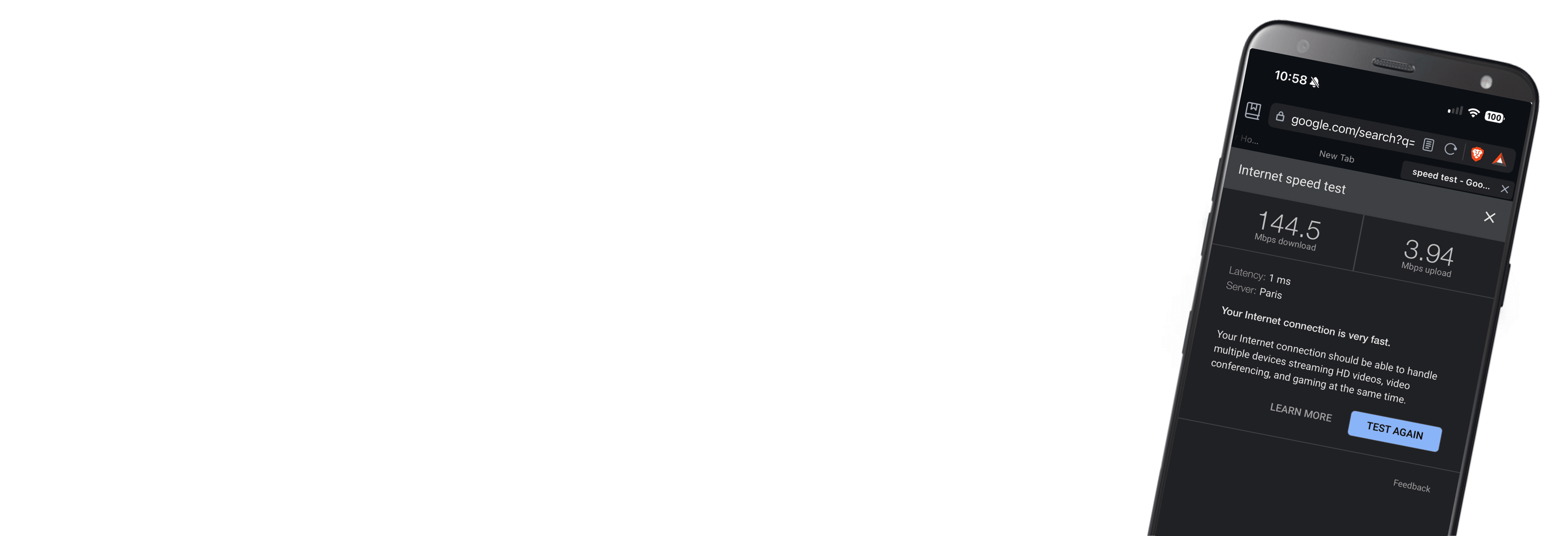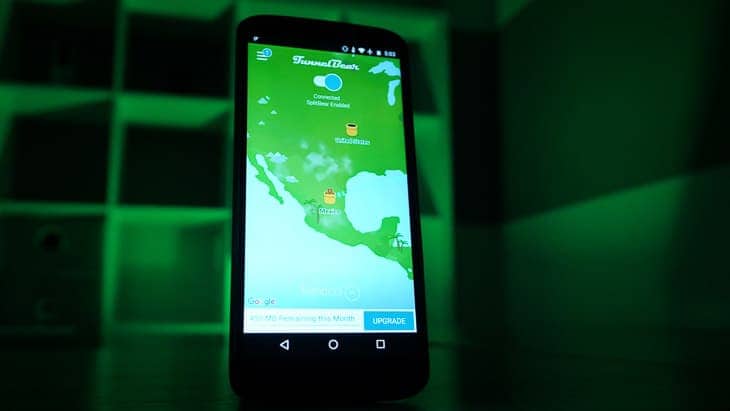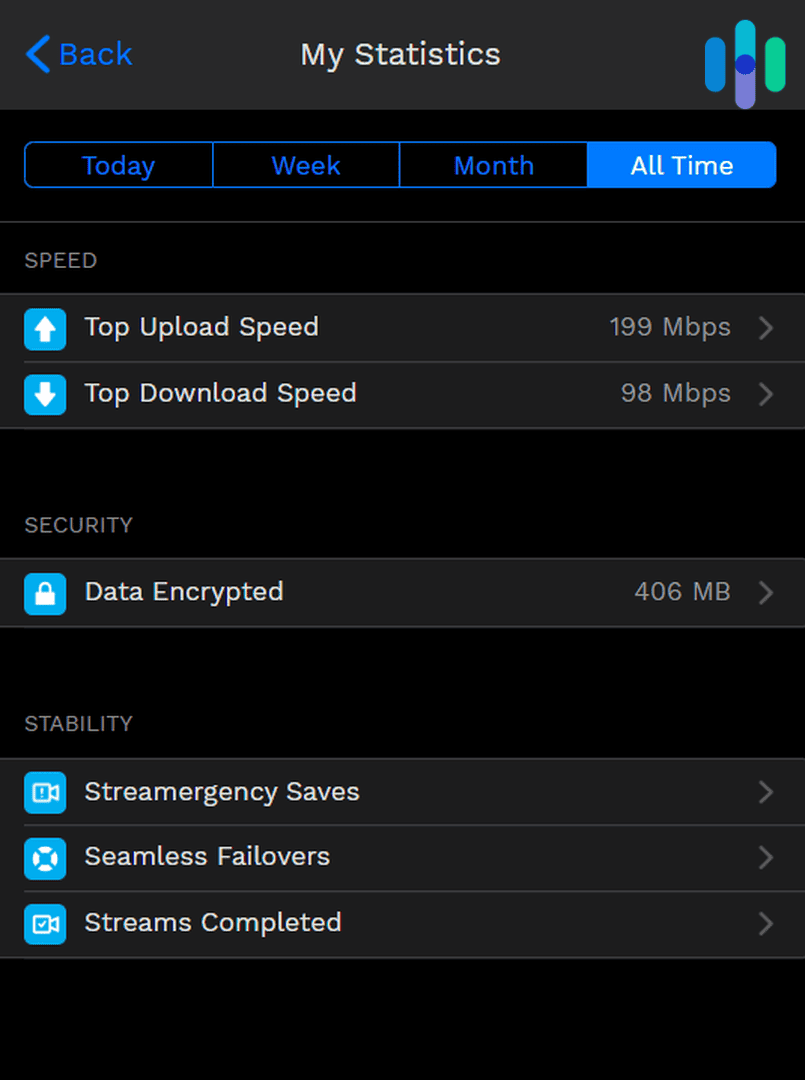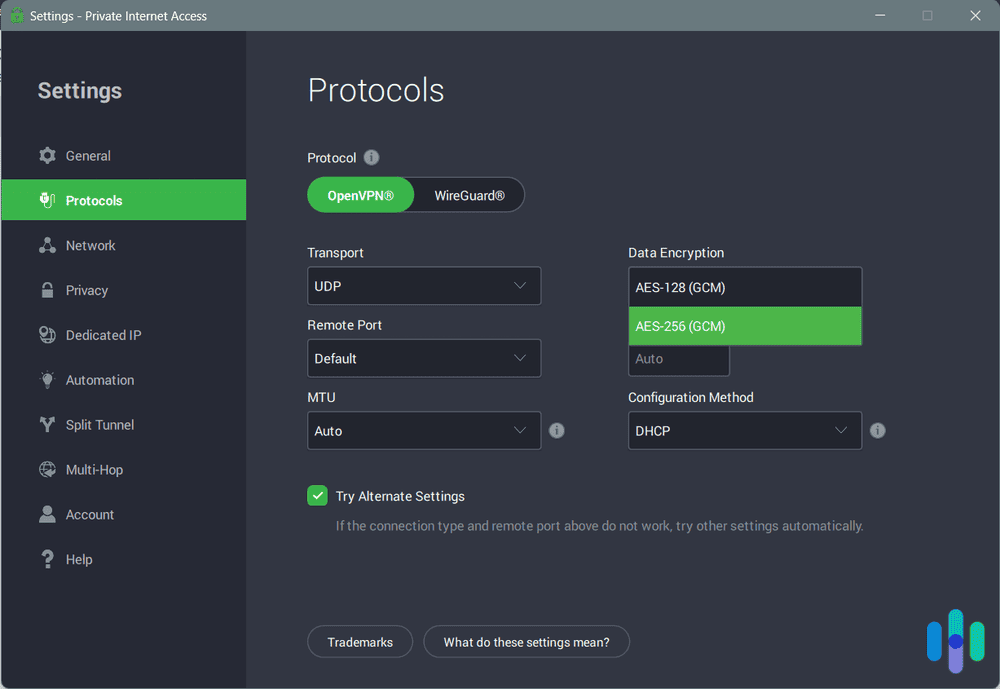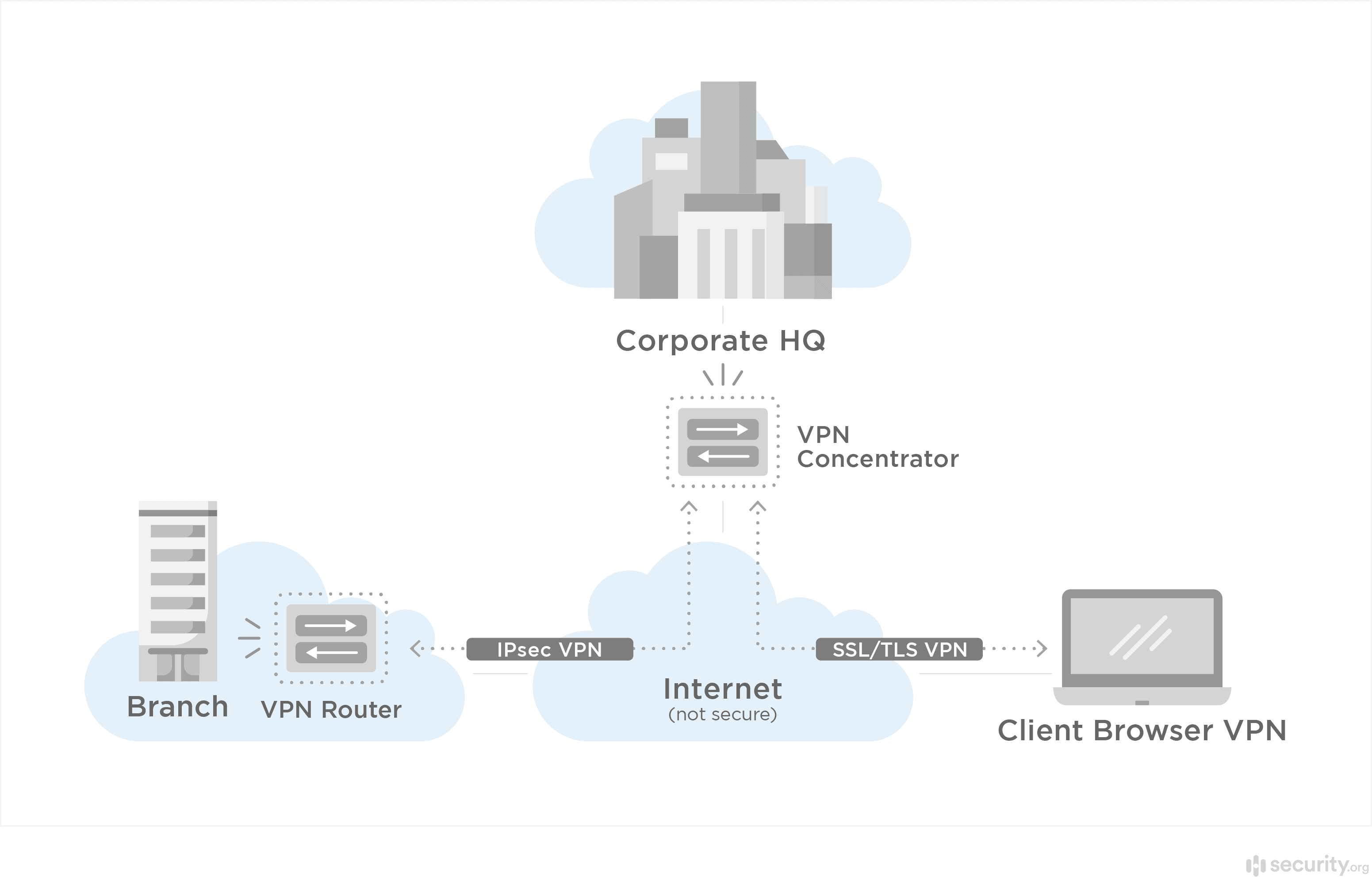Two things matter to us when we’re using the internet – privacy and speed. So it’s a catch-22 that VPNs, the tool we use to guard our privacy, also tend to slow down internet connections.
When you connect to a VPN, your traffic is redirected towards a VPN server. It also gets encrypted. Those additional processes can slow down your connection – sometimes by just a little, other times to a crawl.
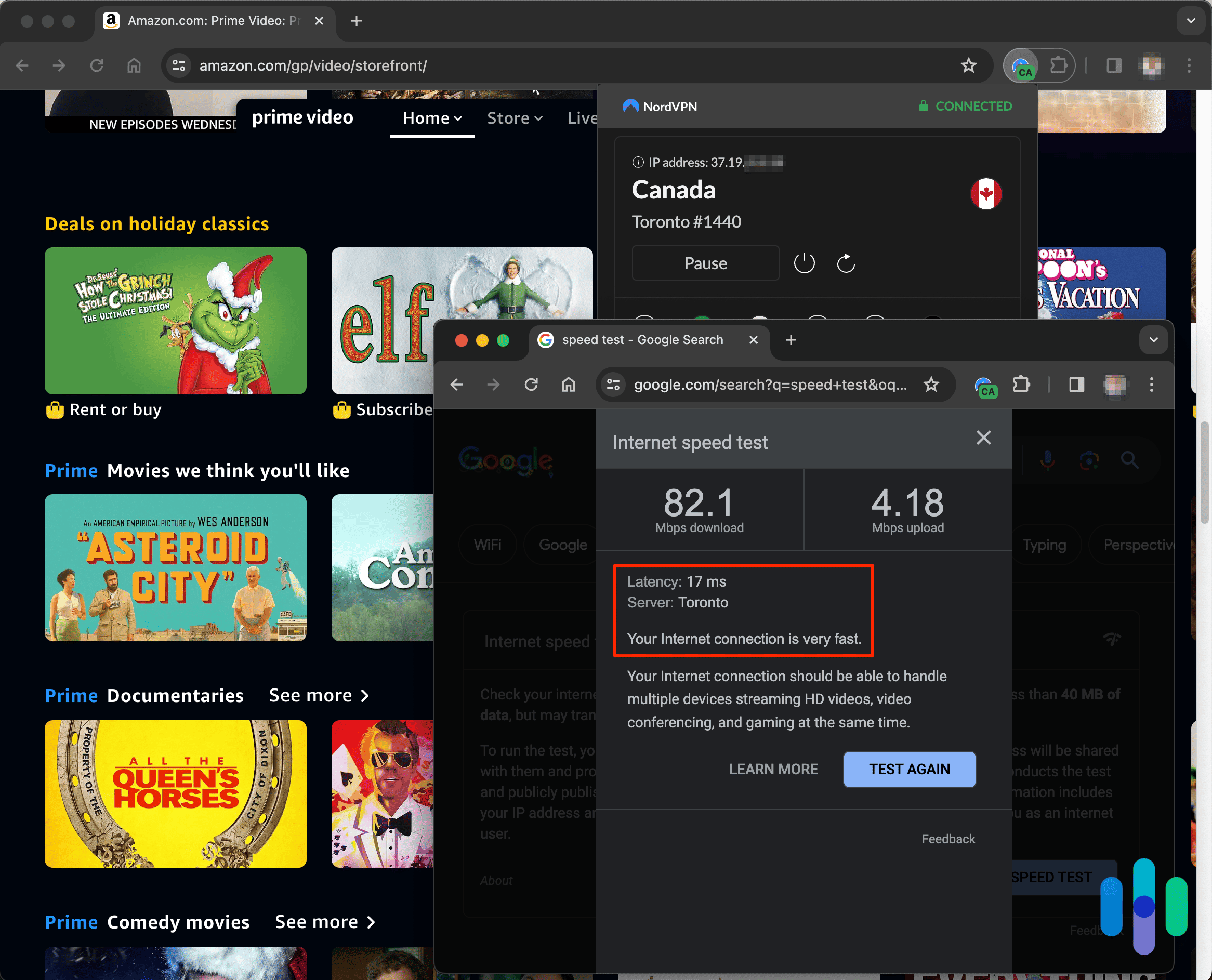
We know from testing dozens of VPNs that some VPNs are simply faster than others. But if you have a curious mind like us, you’re probably wondering which VPN is the absolute fastest. Well, we have the answer right here.
We conducted an experiment to objectively measure the speed of each of the top VPNs, checking their upload speed, download speed and latency. You’ll see the results of our tests below, so without further ado, let’s start!
The Scope of Our VPN Speed Tests
Testing and comparing VPN speeds isn’t as easy as it sounds. Speed test results are volatile and there are plenty of external factors in play, such as the time of day, distance to the server, and local or ISP traffic. We’ll expand on our testing process and explain how we leveled the playing field below, but here’s what you should know about our methodology for now.
First, we tested each VPN 10 times and then averaged the results. Then we compared the average results to our baseline internet speed, which is our internet speed when not connected to a VPN. Finally, in order to rank the VPNs fairly, we calculated the percentage difference between our baseline speed and the average speed of each VPN. The lower the impact of a VPN to our baseline speed, the better. Don’t worry — it’ll all make sense!
The Overall Fastest VPNs
When you say the ‘fastest VPN,” you should look at more than just the download speed. You have to look at the overall speed of both downloads and uploads, as well as the network’s latency. It’s like a triathlon. No matter how fast a runner you are, you won’t finish the race with the best completion time if you’re not a fast swimmer or cycler. You have to be well-rounded and do well in every category.
See this table to find out which VPNs are the best overall performers.
| Ranking | Average download speed (↑Mbps) | Average upload speed (↑Mbps) | Average ping (↓ms) | Further reading |
|---|---|---|---|---|
| No. 1 PureVPN | 90.85 | 90.63 | 86.1 | Read our PureVPN review → |
| No. 2 IPVanish | 90.78 | 89.93 | 78.8 | Read our IPVanish review → |
| No. 3 NordVPN | 89.11 | 90.72 | 78.3 | Read our NordVPN review → |
| No. 4 Proton | 86.07 | 90.66 | 78 | Read our Proton review → |
| No. 5 Hotspot Shield | 91.47 | 18.88 | 79 | Read our Hotspot Shield review → |
| No. 6 Private Internet Access | 90.48 | 14.86 | 86.7 | Read our Private Internet Access review → |
| No. 7 Ivacy | 90.24 | 13.26 | 124.8 | Read our Ivacy review → |
| No. 8 ExpressVPN | 87.48 | 71.65 | 125.8 | Read our ExpressVPN review → |
| No. 9 CyberGhost | 89.53 | 28.66 | 115.2 | Read our CyberGhost review → |
| No. 10 Surfshark | 87.25 | 47.32 | 135.8 | Read our Surfshark review → |
| No. 12 Norton Secure VPN | 86.09 | 11.37 | 125.5 | Read our Norton Secure VPN review → |
Table 1: This table shows our ranking based on how the VPNs performed in all three speed categories. Despite not leading any of the three speed categories, PureVPN, IPVanish, and NordVPN consistently put up excellent numbers across the board.
Fastest Download Speed
The download speed measures how quickly traffic can flow from the internet to your device. A lot of bandwidth-heavy tasks involve downloading – like downloading videos and files, streaming movies and TV shows, and torrenting – which is why the download speed is the first thing most people check when testing internet speed.
If you do a lot of downloading, these are the fastest VPNs for you.
| VPN | Baseline download speed (Mbps) | Average download speed (Mbps) | Percentage difference |
|---|---|---|---|
| Hotspot Shield | 94.46 | 91.47 | -3.17% |
| PureVPN | 94.54 | 90.85 | -3.90% |
| IPVanish | 94.56 | 90.78 | -4.00% |
| Ivacy | 94.38 | 90.24 | -4.39% |
| Private Internet Access | 95.08 | 90.48 | -4.84% |
| CyberGhost | 94.56 | 89.53 | -5.32% |
| NordVPN | 94.57 | 89.11 | -5.78% |
| Atlas VPN | 94.53 | 88.68 | -6.19% |
| ExpressVPN | 94.65 | 87.48 | -7.57% |
| Surfshark | 94.59 | 87.25 | -7.76% |
| Proton | 93.74 | 86.07 | -8.18% |
| Norton Secure VPN | 95.44 | 86.09 | -9.80% |
Table 2: This table shows the VPNs with the fastest download speed based on their impact to our baseline internet speed at the time of our testing. Hotspot Shield, which slowed our internet download speed by only a mere 3.17 percent, topped the ranking.
Fastest Upload Speed
As opposed to download speed, the upload speed affects how fast you can upload to a website or app. A good upload speed is necessary for streamers, as well as content creators and influencers who upload to video platforms like YouTube. If you fit that bill, or if upload speed is important to you for any other reason, these are the VPNs that can best fulfill your needs.
| VPN | Baseline upload speed (Mbps) | Average upload speed (Mbps) | Percentage difference |
|---|---|---|---|
| Proton | 94.52 | 90.66 | -4.08% |
| NordVPN | 94.61 | 90.72 | -4.11% |
| PureVPN | 94.65 | 90.63 | -4.24% |
| IPVanish | 94.68 | 89.93 | -5.02% |
| ExpressVPN | 94.43 | 71.65 | -24.12% |
| Atlas VPN | 94.55 | 64.30 | -31.99% |
| Surfshark | 94.6 | 47.32 | -49.98% |
| CyberGhost | 94.61 | 28.66 | -69.70% |
| Hotspot Shield | 94.56 | 18.88 | -80.03% |
| Private Internet Access | 94.44 | 14.86 | -84.26% |
| Ivacy | 94.68 | 13.26 | -85.99% |
| Norton Secure VPN | 94.59 | 11.37 | -87.98% |
Table 3: This table shows the VPNs with the fastest upload speed. The results varied widely. The leading VPN in upload speed is Proton, which slowed our baseline upload speed by only 4 percent, while other VPNs slowed our upload speed by more than 80 percent.
Lowest Latency
Testing the latency — otherwise known as pinging a network — is the digital equivalent of hitting your network’s knee with a rubber mallet. It measures the network’s reaction time, so the lower the latency, the faster your data packets get from your device to an external network or server. A good latency is necessary for online gamers, since even a few milliseconds of delay could cause lag and ruin the gaming experience.
If you’re looking for the best VPNs for gaming, we ranked the VPNs with the lowest latency impact.
| VPN | Baseline ping (ms) | Average ping (ms) | Percentage difference |
|---|---|---|---|
| Proton | 3 | 78 | 2,500% |
| NordVPN | 3 | 78.3 | 2,510% |
| IPVanish | 3 | 78.8 | 2,527% |
| PureVPN | 3 | 86.1 | 2,770% |
| Private Internet Access | 3 | 86.7 | 2,790% |
| Hotspot Shield | 2 | 79 | 3,850% |
| Ivacy | 3 | 124.8 | 4,060% |
| ExpressVPN | 3 | 125.8 | 4,093% |
| Surfshark | 3 | 135.8 | 4,427% |
| CyberGhost | 2 | 115.2 | 5,660% |
| Norton Secure VPN | 2 | 125.5 | 6,175% |
| Atlas VPN | 2 | 154.1 | 7,605% |
Table 4: This table shows which VPNs have the lowest latency. At two to three milliseconds, our network’s baseline latency is pretty good. As you can see, however, every VPN we tested increased the latency exponentially. Fortunately, some managed to keep it under 100 ms, which is considered a good latency for most online games.
Interesting Findings
As we ran our VPN speed tests, we inevitably bumped into a few interesting findings. Some of them were positive, such as the good download speed results we’ll talk about below. Other findings were not so great. Regardless, here are some of the highlights.
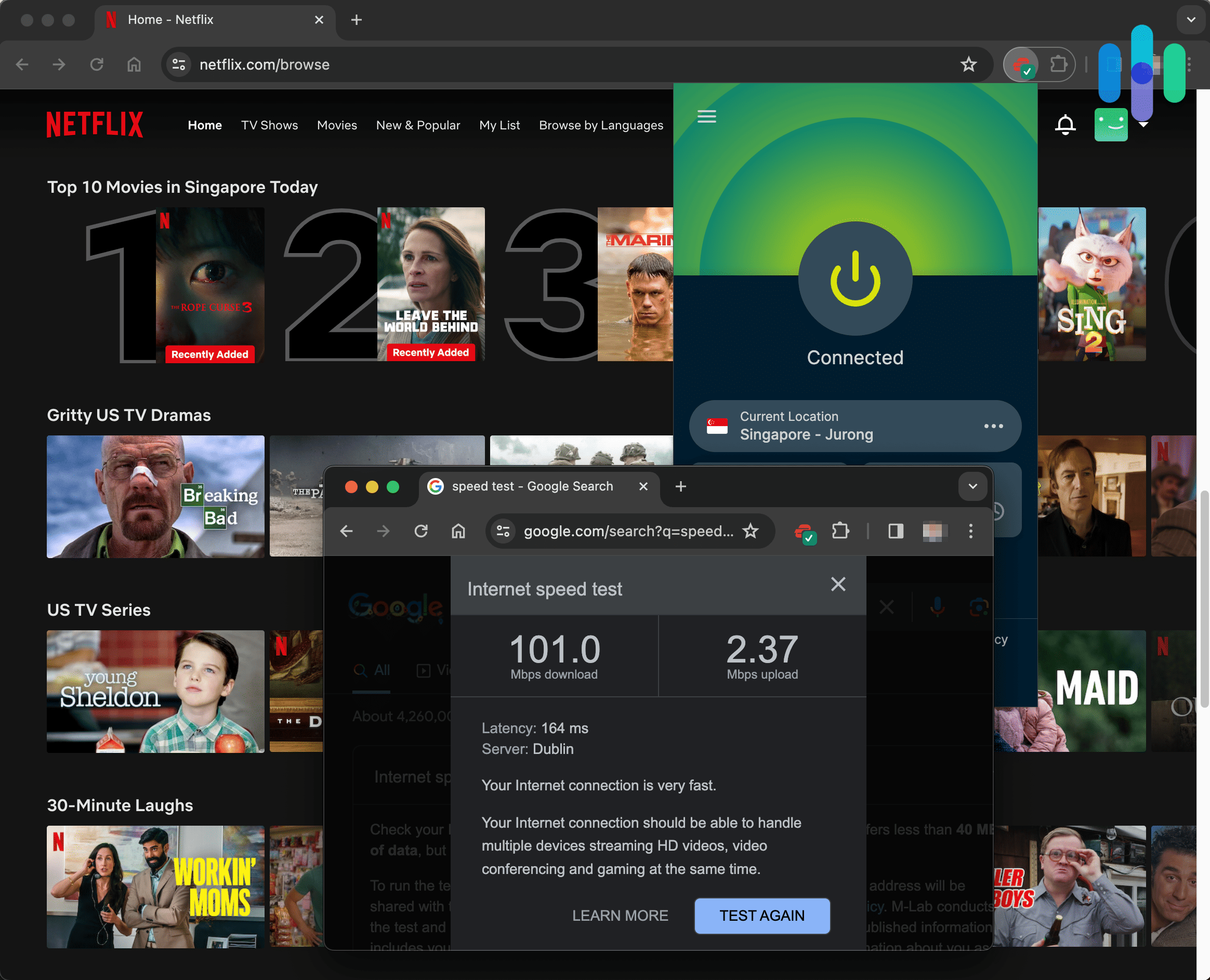
Improved Download Speeds
We noticed a significant improvement in the download speed of the best VPNs. When we started testing VPNs in 2018, the average download speed loss caused by VPNs was around 40 percent. But as you can see in Table 2, all 12 VPNs we compared kept the download speed loss to below 10 percent. That means VPN technology improved over the years.
Take Surfshark, for example. Last time we tested Surfshark, the download speed loss was 31 percent on Mac and 17 percent on Windows. Despite just placing 10th in our download speed ranking, Surfshark still averaged 87.25 Mbps, which is only a 7.76 percent drop compared to the baseline speed at the time we tested Surfshark. Not bad at all.
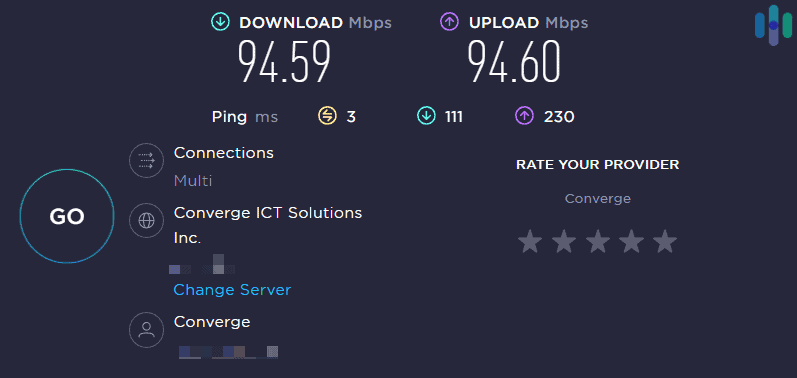
Consistent Latency
Two external factors affect a VPN’s latency reading: your distance from the VPN server and your local network’s idle latency. We’ll expand on the specifics of our testing process later, but we’ve been able to eliminate both external factors by connecting to the same server location (Australia) and having a consistent network latency at two to three milliseconds. That means the steady latency readings from the VPNs we tested are all on the VPNs themselves.
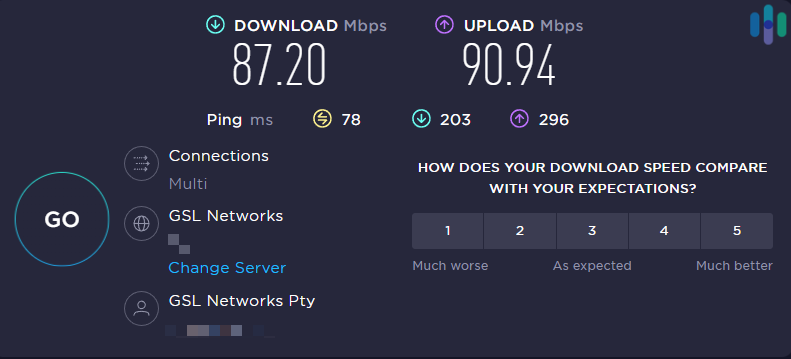
Throughout our tests, we observed consistent latency readings from each VPN, give or take two milliseconds. Proton, the top-seeded VPN in latency, gave us readings of 78 milliseconds 10 out of 10 times.
Keep in mind that we connected to servers in Australia, which is several thousand miles away, thus the slightly elevated ping. The point of this finding, however, is if the VPNs can keep the ping from spiking over long distances, they can almost certainly keep it steady if you connect to a nearby server. If you connect to a nearby server, you’re more likely to get a lower latency reading.
Reconnecting Does Wonders
We designed our tests to simulate typical VPN usage, including testing the effects of disconnecting and then reconnecting to a VPN. We speed tested each VPN 10 times. After the fifth test, we would disconnect, test our baseline speed, and then reconnect.
We found that disconnecting and then reconnecting a slow VPN could improve its speeds. Take Surfshark, for example. In the first five speed tests, its upload speed averaged 4 Mbps.
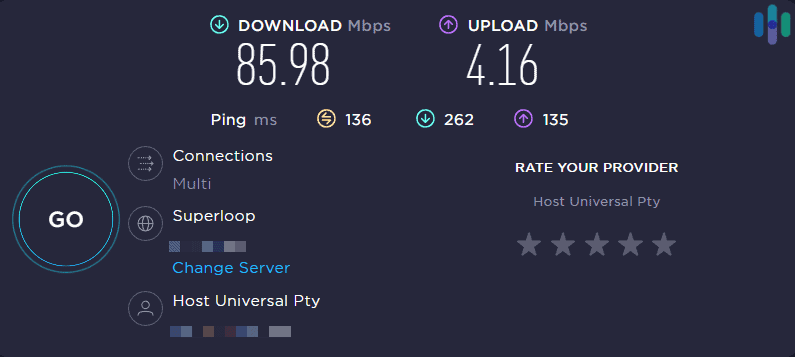
After reconnecting, the upload speed shot up to 90 Mbps. We’re not saying this “trick” works all the time. Some VPNs are just inherently slower. If you’re experiencing slow VPN speeds, however, starting a fresh connection may just be the quick fix you need.
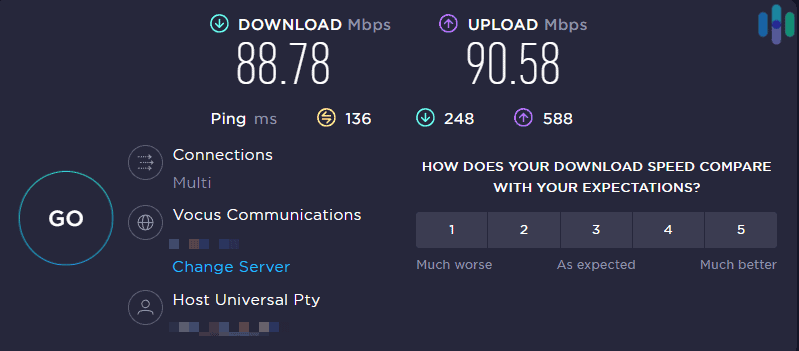
Symmetrical Speed Is Still Rare
One of the not-so-positive things we noted is that symmetrical speed in VPNs is still quite rare. Our network’s speed is symmetrical, meaning the upload speed and download speed roughly match. Only half the VPNs we tested, however, consistently put up symmetrical readings.
The disparity between the upload speed and download speed can be quite huge. With Ivacy, for instance, the average download speed was excellent at 90 Mbps. The average upload speed, on the other hand, was only 13 Mbps.
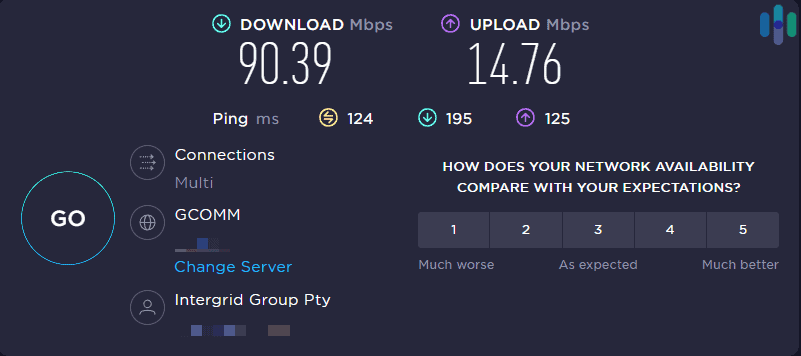
When VPN providers talk about being fast, they’re usually referring to the download speed — but that doesn’t always mean they have a fast upload speed as well.
FYI: You’re most likely to see symmetrical internet speed in fiber internet plans because fiber-optic connections have a much higher data delivery capacity than other internet types.
How We Test VPN Speeds
Like our fifth-grade math teacher always said, “Show your work.” To fairly judge the speed of VPNs, we designed a testing process that levels the playing field. That means eliminating outside factors that could skew our results and creating an optimal testing environment. How did we do it?
The Device Parameters
Have you ever wondered why your iPad seems to get better speed test results than your MacBook? The network configuration of each device varies, plus the operating system and physical network adapters on the device can cause variance in test results. For that reason, we used only one device to test all the VPNs.
We used a custom-built PC running Windows 10 Home. It has an Ethernet port built into its Asus motherboard, which is where we plugged the CAT5 Ethernet cable connected to our modem. We also ensured that no programs were running besides Chrome and the VPN, and we turned off all automatic updates so our PC wouldn’t download anything in the background.
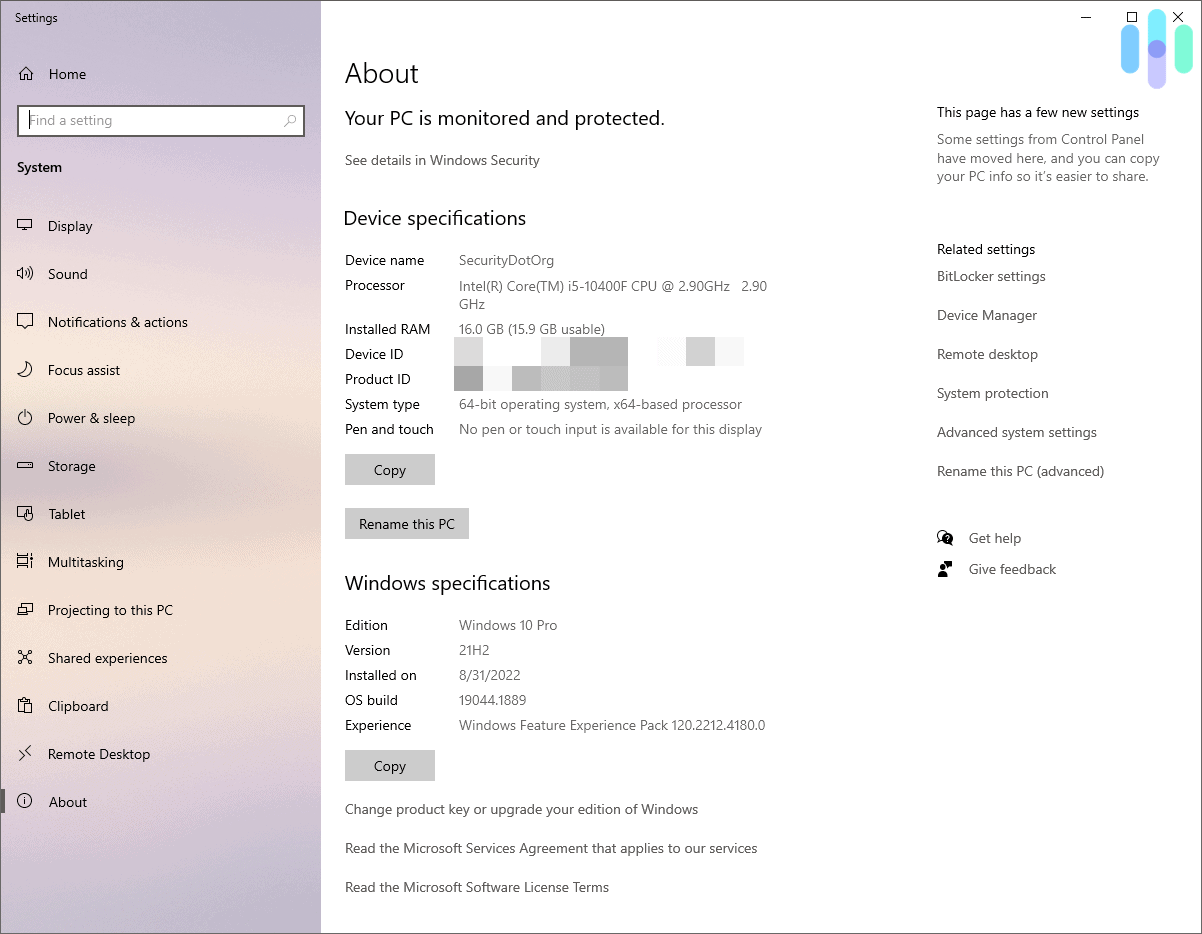
The Network Parameters
To ensure the integrity of our network, we turned it into a virtual “clean room.” We disconnected any other device besides our testing computer, and then turned off the router’s Wi-Fi and VoIP service.
Our internet connection is fiber-optic with speeds capped at 100 Mbps. We used the stock modem and router provided by our ISP, and an ethernet cable to connect our testing computer. As opposed to using Wi-Fi, using a wired internet connection eliminates interference and wireless delays.
The VPN Configurations
Most VPNs work fresh off installation, but you can configure them to change things like VPN protocol, encryption level, and server location. We wanted to get the best possible speed from each VPN, but we also didn’t want any of the VPNs to gain unfair advantages over the others.
In the end, we decided it’s best to configure the VPNs this way:
- Server location: Instead of connecting to the “best server,” an option available with most VPNs, we connected to servers in Australia exclusively. Australia is roughly 10,000 miles away from New York, give or take 1,000 miles depending on the city. We could have chosen a smaller country to minimize the distance margin, but we chose Australia because it has good internet infrastructure, meaning we were more likely to get reliable results.
- Encryption standard: Almost every VPN we tested defaulted to 256-bit AES encryption. There were a couple, however, that offered 128-bit AES encryption by default, and so we changed them to 256-bit AES before testing.
- VPN Protocol: There is a debate as to which VPN protocol is the fastest and most secure. WireGuard is definitely a contender, but not all the VPNs we tested offered it. There are also proprietary protocols like NordLynx from NordVPN and Lightway from ExpressVPN that promise good speeds. To keep the playing field level, however, we decided to use OpenVPN exclusively, a widely available and battle-tested VPN protocol.
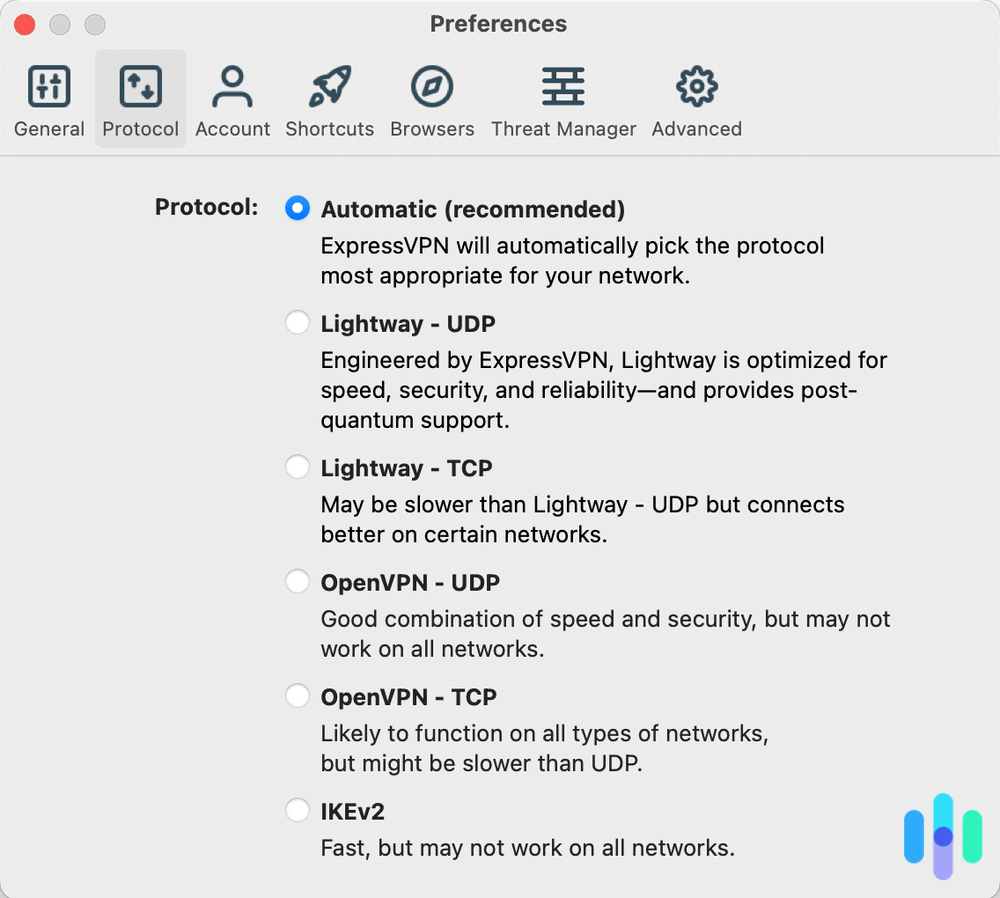
Additional Information: OpenVPN1 is an open-source VPN protocol that VPN providers can use in their products. It was first released in 2001, but countless improvements have been made to the protocol since then.
The Testing Process
With everything set up, we started testing. Our process is pretty standard. We tested each VPN 10 times using Ookla’s speed test tool2 and then averaged the results. We disconnected and reconnected each VPN after the fifth speed test to simulate real-world use. It’s also to give VPNs that were not performing well a second chance, and to see if the well-performing ones only got lucky.
To rank the VPNs, we compared their average speed to our baseline speed, which, again, is our network’s speed when not connected to a VPN. There was one more factor we had to eliminate, however: our network’s varying speed.
It’s common knowledge that network speeds change throughout the day. Most ISPs provide faster connections at night, for example, when traffic is low and there are fewer internet users. During peak hours, on the other hand, ISP speeds tend to fluctuate.
To make sure we’re comparing the speed of each VPN to our current internet speed, we took a baseline speed test in the middle of testing each VPN — specifically after the fifth VPN speed test.
From there, it was all just computing the percentage difference between the average VPN speed and current baseline speed, ranking the results, and scoring each VPN based on their ranking in each category.
Further Reading: Answering VPN Speed FAQs
The discussion surrounding VPN speed is wide-ranging, and we can’t possibly cover it all in a single guide. We can, however, answer some of the most pressing questions about VPN speeds.
- Can VPNs boost my internet speeds?
- What factors affect VPN speeds?
- How do I boost my VPN speed?
- Is VPN speed the most important factor?
Can VPNs Boost Internet Speeds?
We tested VPN speeds a total of 120 times for this guide. We have a pretty good sample size, so you can trust us when we say that VPNs don’t normally boost internet speeds. Our upload speed and download speed went down whenever we connected to a VPN. At the same time, the latency increased.
There’s a reason for that speed drop. VPNs encrypt your traffic, and that additional process shaves off some of your internet speed. VPNs also reroute your traffic through one of their servers. Just as adding a bathroom break to your journey won’t shorten your travel time, adding an extra stop to your online traffic’s route will only result in delays. As short as those delays may be, they are still delays.
There is one exception though. If your ISP is throttling your internet, using a VPN could make your connection faster. ISP throttling is when your provider purposely limits your speed when accessing the internet or some sites. Some ISPs do it when you exceed your monthly data cap or bandwidth limit; in those cases, a VPN unfortunately can’t help you.
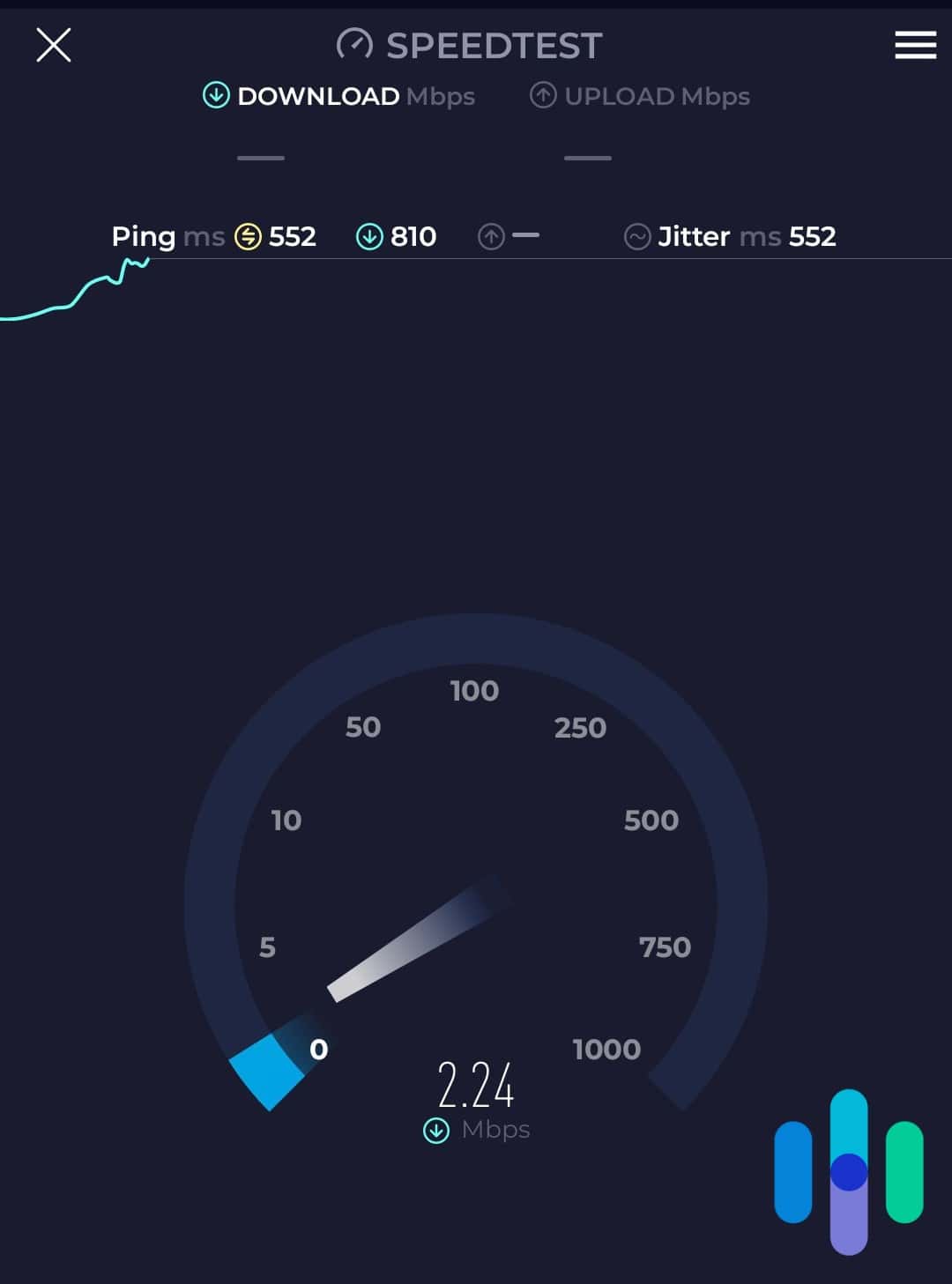
Others throttle internet speeds for more controversial reasons, such as to discourage access to a certain service and drive users toward alternative services that benefit the ISP or its partners. If that’s your case, using a VPN will hide your internet traffic from your ISP. Without knowing what you’re doing online, your ISP won’t be able to limit your access.
Fast Fact: When net neutrality was repealed in 2018, it made the throttling of access to certain sites and types of services not only possible, but legal. A study published in early 2019 suggests that ISPs are “giving a fixed amount of bandwidth” to video streaming services, citing Netflix, YouTube, and NBC Sports as some of the examples.3
What Factors Affect VPN Speeds?
Numerous factors can affect VPN speeds, which is why we painstakingly designed our testing process to limit the effect of those factors. Your current internet speed, the device you’re using, its operating system and network adapters, and even the activity of other devices on your network can affect your VPN speed.
Some factors, however, affect VPN speed more than others, and those are the most important things to consider when testing internet speeds.
- Distance to the server: You’re more likely to get better speeds if you connect to a server closer to you. Your traffic’s travel time is shorter when the distance it has to cover is shorter as well.
- VPN protocol: The VPN protocol dictates how your VPN processes your traffic. Some protocols, such as WireGuard, OpenVPN, and IKEv2/IPSec, are faster.
- Server load: Just as vehicles could bottleneck at toll gates when there’s a high volume of traffic, your online traffic could get stuck at VPN servers. Since VPN servers can process only so much data at a time, using a high-load server can severely affect your VPN speed.
How to Boost Your VPN Speed
If you’re getting unsatisfactory speeds from your VPN, there are a few things you can try.
-
- Pick a different server: It’s possible that the server you’re connected to is crowded or just slow. The first thing you should do is start with a fresh connection.
- Configure your encryption/VPN protocol: Your VPN’s encryption and protocols have huge effects on your privacy and network security. If your current activity doesn’t call for that much security — if you’re downloading or trying to stream a movie, for instance — temporarily reducing your encryption level or changing to a less secure but faster VPN protocol can improve your VPN speed.
- Try split tunneling: Split tunneling lets you split your internet traffic. As determined by you, some traffic will pass through your VPN’s secure network, while other traffic will be unprotected. Enabling split tunneling and choosing to tunnel traffic only from apps with privacy implications can lessen a VPN’s load.
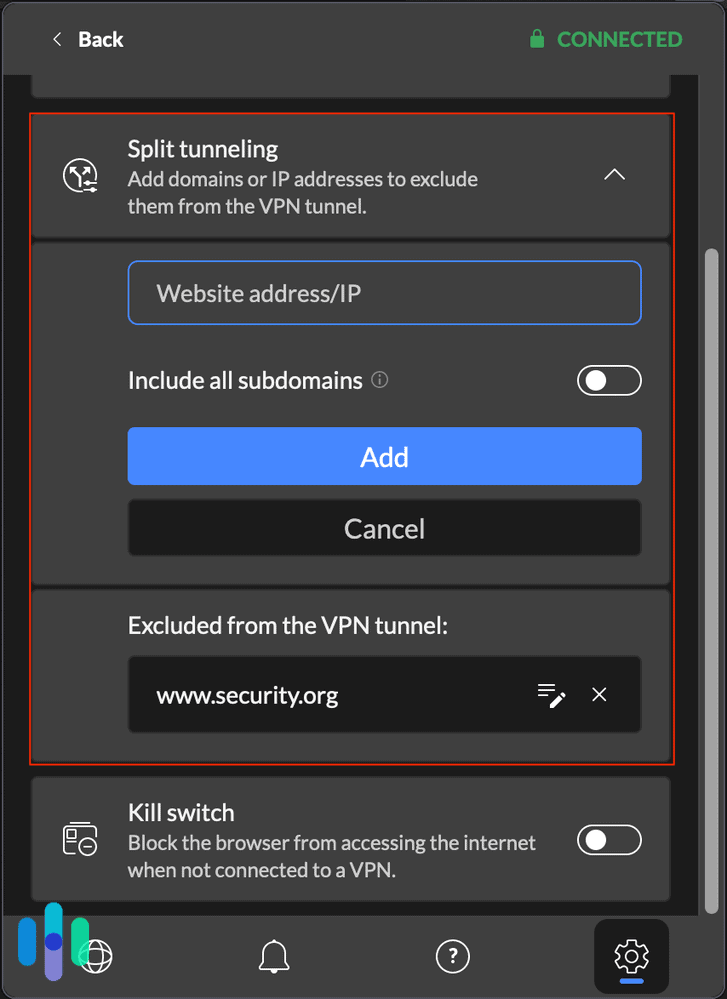
- Close background apps and check your firewall: If none of the above tips worked, check your device itself. Your computer’s background apps could be using a lot of bandwidth or your firewall could be limiting your VPN’s access to the internet. If it’s the former, close your background apps. If it’s the latter, temporarily give the VPN unrestricted internet access.
- If all else fails, opt for a different VPN provider: If absolutely nothing works to boost your VPN speed, it may be time to consider switching providers. Luckily, you have this handy guide to the fastest VPNs on the market.
Is VPN Speed the Most Important Factor?
Speed is one of the most important factors when choosing a VPN, but it’s not the only one. Security, privacy, and cost are other factors to consider. It’s all about balance.
A VPN’s security relies on the technology it uses, meaning the VPN protocol, encryption method, and server implementation. A secure VPN should be able to hide your IP address well and should not have DNS or WebRTC leaks.
A VPN with good privacy practices knows how to take care of both your online data when using the service and personal data they kept when you signed up. Reading the VPN’s privacy policy is a good place to start, as well as understanding the legal obligations the company has to the government with jurisdiction over it. Some countries (including the United States) have legal power to obtain customer data from companies in their jurisdiction.
» Learn more: Are All VPNs Legal?
The cost is pretty self-explanatory. VPN prices range from about $2 per month to $15 per month, depending on the brand and the length of your subscription. Typically signing up for a longer subscription will land you better prices, but month-to-month subscriptions, although more expensive, offer more flexibility.
Final Words
Our world continues to go digital, so the demand for internet speed and bandwidth is only going to increase. VPNs, as one of the most important cybersecurity tools, should be able to keep up, and they’re doing a pretty good job based on the results of our tests.
That said, VPN technology changes all the time. New proprietary VPN protocols are being developed, existing VPN protocols are receiving improvement updates on a regular basis, and VPN providers are always upgrading their server infrastructure.
We’re keeping an eye on those changes, and we’ve made a commitment to frequently test the top VPNs’ speeds to turn this page into the ultimate VPN speed guide. So before you leave, bookmark this page and check back every so often for the latest information!

